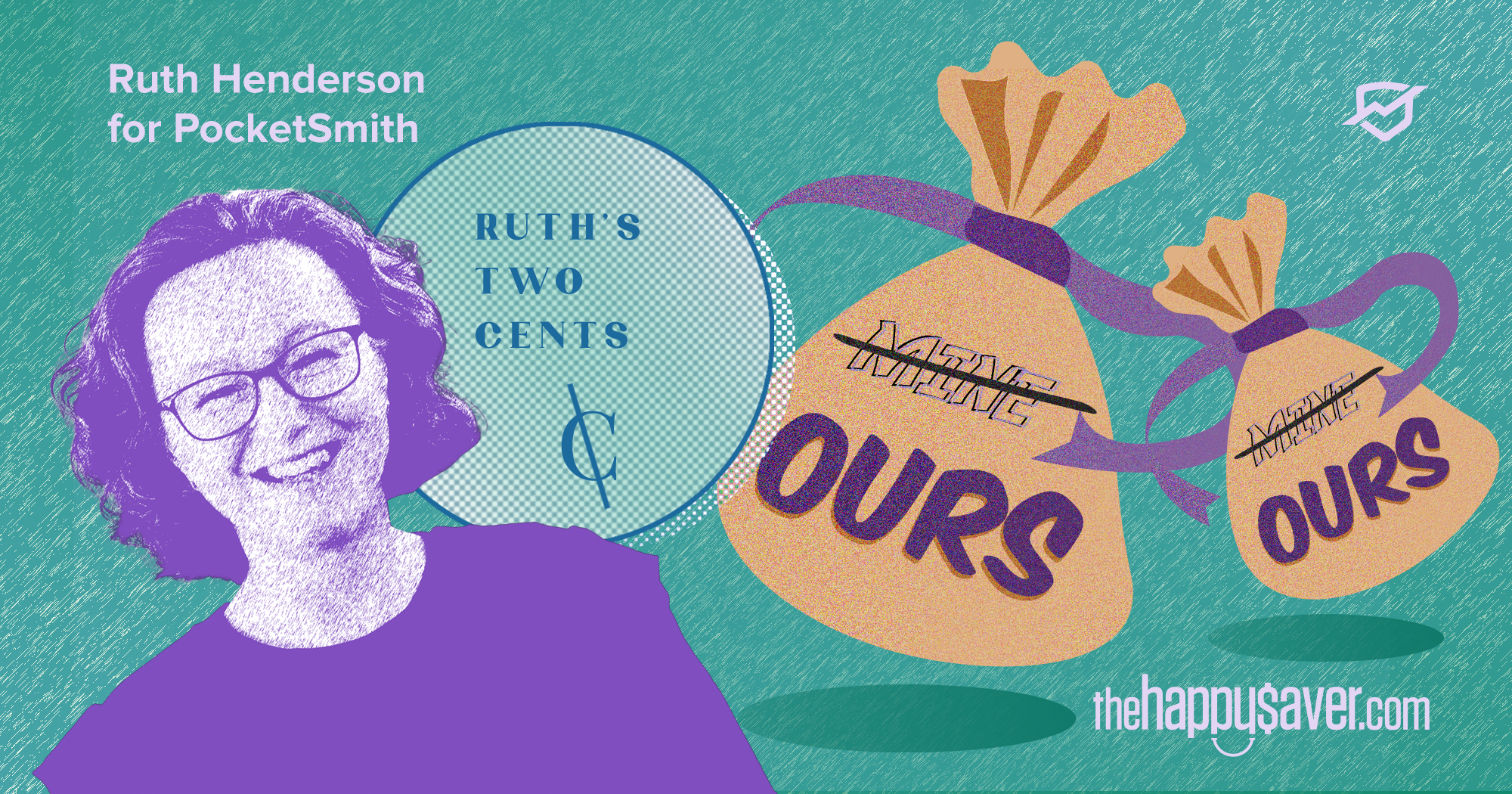
Hi Ruth,
My partner and I have recently gotten engaged. It’s exciting times! Now we’re taking the chance to go over all of the ways we’re joining our lives together, and of course, our finances are a big one. This is the first time both of us have combined our money with someone else. What should we do to prepare? To what extent should we join our finances together?
Congratulations on your engagement! It is terrific news that you have found someone to share your life with.
I’m not going to beat around the bush here. I’m for maximum sharing, unity, participation, and connection in a relationship. It’s not old-fashioned to join your money with someone you love; it’s immensely practical and empowering. If I’ve found my person, I’m all in, and it’s us against the world! And that includes anything to do with money, with no distinction between who earned or spent what. As soon as $100 hits our bank account, it’s irrelevant who made it; it’s ‘our’ money and deciding how to use it unites us as a couple.
It might surprise you to learn, but my husband and I have never had one single argument about money. In case I was wrong, I asked him, and he confirmed it. And I can only put that down to talking about money very early on in our relationship. Then as we progressed to marriage and having a family, the conversations never stopped. As in all aspects of our marriage, we are a team, and we address money as a team because, in my experience of watching how thousands of others handle their money, those who are financially united can better create a long-term vision for their relationship. And that is what builds a strong marriage.
Very early in our relationship, I was nosey and wanted to know my partner’s exact financial situation, and I shared mine. Full disclosure was crucial because I was trying to look under every rock for potential problems before fully getting involved. When it came to money, it was essential to work out if we were compatible because we could create a future together, not as two separate financial entities. With no cause for concern, I trusted him with money, and he trusted me too. Trust is a huge deal.
I’m assuming that you have already been talking openly about how you feel about money, how you save and spend money, what you earn, what debts and investments you have and where you see your financial future going.
If there have been some sticking points during this time, then before you get married, they need to be discussed in direct sunlight; no point sweeping a tricky conversation under the carpet. It will only resurface at a later and more inconvenient date. For example, if one of you doesn’t want to disclose their debts or income, that’s a red flag. Best to resolve and reach an agreement now than years into your marriage. If you have trouble trusting your partner before marriage, you are destined for divorce. The fastest way to halve your net worth is to get divorced.
Before you are married, a great place to start is by creating a list where you both write down all your financial information, each noting down what you own and owe. Note down the bank you use, all your accounts, and their balances. Write down your retirement accounts and balances. Your liabilities and your assets, as well as your monthly incomes and outgoings. Also, talk about the insurance that you each have and what changes you might need to consider after marriage — for example, adding your spouse to your life insurance policy. Now is also a good time to discuss updating your wills to include the other after marriage. Compare notes, discuss the decision-making process behind each area of your financial life, and let each other give their opinions on the pros and cons of those decisions.
Make no mistake; this is going deep. You are laying your financial soul bare. But it’s this sharing of such detailed information that will unite you as a couple. If it throws up more questions than answers, pour a glass of wine, and discuss!
The key to successfully managing money as a couple is talking and negotiating, therefore being able to explain the benefits of each of your money systems means you will be better able to pull out the bits that work for both of you and implement those once married and negotiate your way through the rest. Like in every other part of marriage, money is a compromise where you can reach an agreement that both of you are happy with.
Given that you now know where you both stand today, both take the time to think ahead, like all the way ahead, to when you are both old and wrinkly. How do you dream about your life together as you move through the years? This is how goals get set, by creating a shared vision of your future.
The over-arching sentiment when it comes to joint finances is that you are working together to create a better financial future for both of you while at the same time appreciating that life evolves and changes. At different times, you will each contribute and spend differently. But as long as you mutually agree, you are all good. Shared finances and viewing money as ‘ours’ especially comes into its own if you go on to have children together or one of you decides to take a break from working, making it impossible for both of you to contribute evenly. Combined finances take the pressure off you even having to calculate what the other does or does not contribute.

If you clearly understand each other’s financial position going into a marriage, and understand how the other uses money, then once the rings have been exchanged, you can formulate a plan for your joint money. Combining finances takes far longer than you realize, so this process needs to be started early in your marriage and implemented slowly and with the consent of both of you. It is natural for one person to be more engaged in this, which is absolutely fine; play to your strengths, I say. But the trick is that even if one of you is handling daily money chores, both of you fully understand what is happening with the money, and you both have an equal say.
Once you are married, it is a matter of coming up with an overall plan for your money and merging your systems that you each noted before marriage. This will naturally mean that some bank accounts are opened while some are closed, cutting down on double-ups and fees. The same will be true for the subscription services you have. For each account, whether a banking or a utility account, where you can, you will need to put both of your names on them and set up passwords to have full access to all areas. Transparency is key.
It is about respect for each other and having an equal say. You will need to communicate with each other about what brings you anxiety about what the other is doing with your money, and you will only discover these sticky points after you start working from the same bank account. For example, one of you might keep a chequing account at a minimum balance and feel perfectly calm about that; the other might panic that their card will be declined, so it’s about reaching a compromise over what a minimum balance should be. Or, if you don’t like being surprised by unexpected expenses showing up on your account, you might do as I do, create a mutual agreement that you won’t spend over a certain dollar amount without running it past the other person first.
This point is essential. it is not about power and control; it is about prudent financial management where you communicate about upcoming expenses as a team. Plus, it gets you to understand that as a couple, you will undoubtedly spend different amounts and differently from each other, but it doesn’t matter what is purchased, just that you mutually agree on it.
As a team, we are continually assessing how the earning, spending and investing decisions we are making are moving us further towards or further away from our goals. Even with the daily touch points that you have with money, it’s essential to take some time (once a month is perfect) to sit down and quickly check for anything money-related that needs your attention. It’s your opportunity to zoom out and decide whether you need to make any tweaks or changes or discuss and plan for anything on your horizon. This is when you will honestly feel like you each have the full support of the other.
I wish you well; I’m sure you will be a formidable financial team. All the best for a long, loving and happy life together.
Got a burning money question for Ruth? Send them through to [email protected]!
Ruth blogs at thehappysaver.com all about how she and her family handle money. What’s the secret? Spend less than you earn, invest the difference, avoid debt and budget each dollar that flows through your hands. She firmly believes that if you can just get the basics right, life becomes easier from there on in.